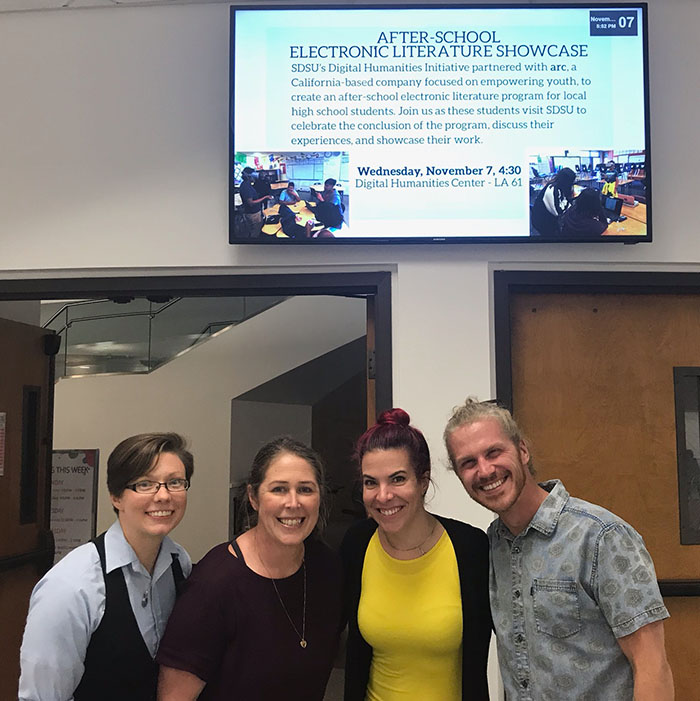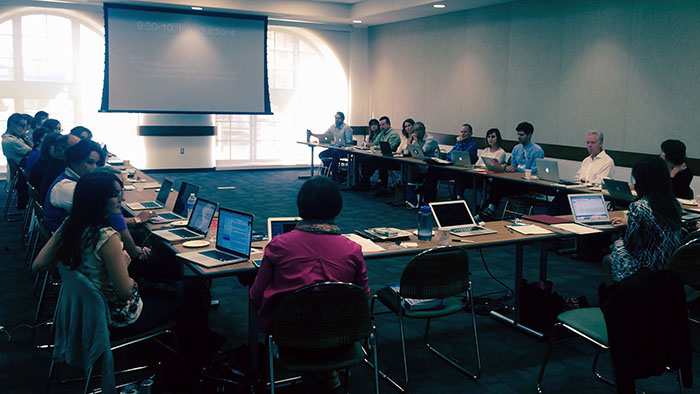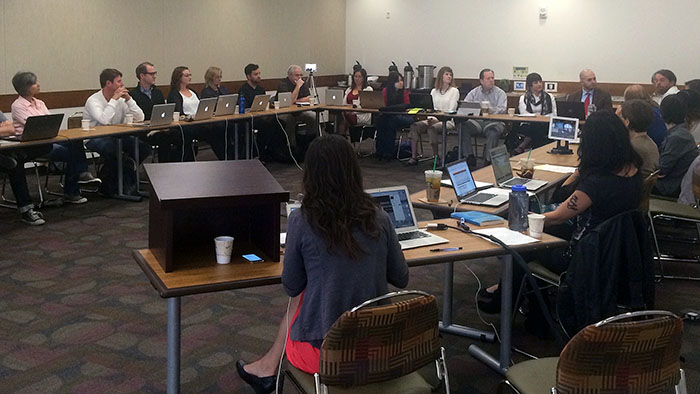Past Programs

Electronic Literature
We continue to experiment with partnerships and pilot programs to expand or enhance our E-Lit programming and pedagogical opportunities. In fall 2018, SDSU’s Digital Humanities Initiative partnered with arc, a California-based organization that runs after school and experiential education programs, to create an after-school electronic literature program for local high school students. High school students learned to experiment with digital tools and writing practices throughout the semester. They then came to campus to showcase their electronic literature on November 7, 2018 in the Digital Humanities Center. For some of the students, this was their first time on a college campus; for most, it was their first time creating and showcasing digital art. In addition to the public outreach component of this program, students at SDSU benefitted from this experiment in E-Lit programming because the teachers of the program were MA and MFA students. They developed the curriculum, taught the classes, maintained the blog, and more. They received a once-in-a-lifetime opportunity to teach E-Lit with support and guidance from an expert in E-Lit, Professor Jessica Pressman, and in ways that enhanced their understanding of the art forms of E-Lit and pedagogy.

NEH Grant
During the 2015-16 academic year, we led a start-up grant project funded by the National Endowment of the Humanities (NEH), “Building and Strengthening Digital Humanities through a Regional Network.”
We collaborated with our regional partners–faculty at UCSD, USD, CSU San Marcos, San Diego Mesa College, San Diego City College, and Palomar College–to establish SD|DH, a regional network for Digital Humanities.
We worked from the shared understanding that Digital Humanities (DH) offers great pedagogical opportunities for teachers and students, and DH-trained humanities students can help meet employment demand in STEM fields. But, implementation of DH practices is harder at certain schools than others. The result is unequal access to DH. This is especially felt in a region like our own–San Diego, California–a place full of state-schools slowly rebounding from years of severe budget cuts, particularly the public teaching schools grappling with impacted class sizes and overburdened faculty. To address this situation, we gathered as a community to foster Digital Humanities in our region via a network of faculty working across different institutions with differently-distributed resources.
This year-long initiative included a two-day workshop about DH pedagogical innovation, during which participants developed specific goals and pedagogical prototypes that they then tested at their home institutions during the academic year. A final meeting, at the end of the year, reassembled participants to assess, refine, and publicize findings. The workshops provided space and support for developing and testing concrete approaches to teaching DH. They were carefully organized to build upon each other but also allowed flexibility within the sessions for hands-on activities and free-flowing discussion and maintained a sense of ground-up community building.
You can read about our plan, process, and outcomes on this website archive.

Reboot
Reboot and Reboot 2.0 were cornerstone events for Digital Humanities at SDSU.
Held in May 2014 and 2015, Reboot was a day-long “camp” for faculty from the College or Arts and Letters (CAL). The goal: to re-enhance intellectual energy amongst CAL faculty and build a research community interested in exploring the impact of the digital.
The two Reboot camps helped introduce CAL faculty to digital humanities tools, research practices, and projects and laid the foundation for what would become DH@SDSU. Together we identified goals and desired outcomes for a possible digital humanities initiative for SDSU, and we solidified a core faculty committed to this endeavor.
Reboot lived up to its name. SDSU’s grass-roots, faculty-led Digital Humanities Initiative was born.

